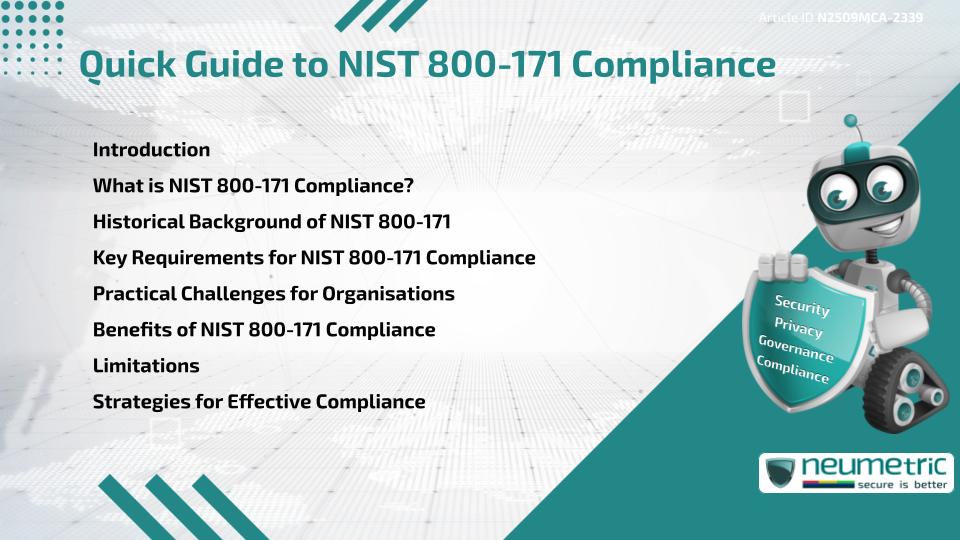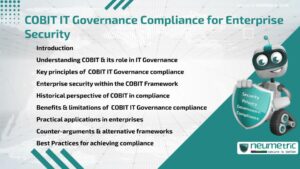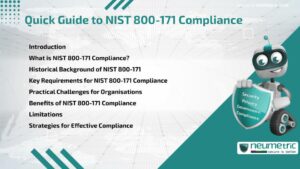Table of Contents
ToggleIntroduction
NIST 800-171 Compliance is a critical requirement for organisations handling Controlled Unclassified Information [CUI] for U.S. Federal Agencies. The Framework, created by the National Institute of Standards & Technology [NIST], provides a set of Security requirements to protect sensitive but unclassified data. For Contractors & Partners in the Federal Supply Chain, Compliance is both a Contractual obligation & a Foundation for strong Data Security.
What is NIST 800-171 Compliance?
NIST 800-171 Compliance refers to aligning organisational Security Practices with the guidelines in NIST SP 800-171. These guidelines define How Non-federal Systems should protect CUI. They cover 14 Control families, including Access Control, Incident Response, Risk Assessment & System Integrity. Compliance demonstrates that an organisation can securely handle Sensitive Federal Data.
Historical Background of NIST 800-171
The Standard was first introduced in 2015 in response to growing CyberSecurity Risks within Federal Supply Chains. Before its release, Contractors lacked a consistent Framework for Safeguarding CUI. NIST 800-171 filled this gap by adapting the broader NIST 800-53 Controls into a streamlined set for Non-federal Entities. Over time, Compliance became mandatory for organisations working with the Department of Defense & Other Agencies.
Key Requirements for NIST 800-171 Compliance
Organisations must address several Areas to comply:
- Enforcing strong Access Controls, including Multi-factor Authentication
- Protecting Data In Transit & At Rest with Encryption
- Monitoring & Logging User activities for Accountability
- Establishing Incident Response & Recovery Procedures
- Conducting regular Risk Assessments & Vulnerability Scans
- Training Employees on Security Awareness & Compliance responsibilities
Practical Challenges for Organisations
Compliance can be demanding, particularly for Small & Mid-sized businesses. Implementing Technical Safeguards such as Encryption & Monitoring Tools requires investment. Documenting Compliance efforts, such as creating System Security Plans [SSPs] and Plans of Action & Milestones [POA&Ms], adds administrative overhead. Coordinating across IT, Legal & Operations Teams can also be challenging.
Benefits of NIST 800-171 Compliance
Despite difficulties, Compliance provides clear benefits:
- Eligibility for Federal contracts & continued participation in Supply Chains
- Stronger Data Security & reduced Risk of Breaches
- Improved alignment with broader Standards like ISO 27001
- Increased trust with Government Partners & Regulators
- A foundation for meeting future Frameworks such as CMMC (CyberSecurity Maturity Model Certification)
Limitations
Critics argue that Compliance may impose high costs on small Contractors. Others suggest that strict adherence could hinder Operational flexibility. Additionally, Compliance reduces Risks but cannot eliminate all Vulnerabilities, especially against Advanced Persistent Threats [APT].
Strategies for Effective Compliance
To achieve & maintain NIST 800-171 Compliance, organisations should:
- Perform a Gap Analysis against the 14 Control Families
- Develop SSPs & POA&Ms to document Compliance Progress
- Use Automated Tools for monitoring & reporting
- Train Employees regularly on Security Practices
- Reference Governance Frameworks from OECD, World Bank & ENISA to strengthen processes
Takeaways
NIST 800-171 Compliance is more than a Regulatory requirement, it is a strategic approach to securing Sensitive Data & Maintaining eligibility for Federal Contracts. By embedding its principles into Operations, organisations can strengthen Security, build trust & ensure Long-term Resilience.
FAQ
What is NIST 800-171 Compliance?
It is adherence to NIST guidelines for protecting Controlled Unclassified Information in Non-federal Systems.
Why is Compliance important?
It is mandatory for Federal Contractors & Strengthens overall Data Security.
What are the Key requirements?
Access Controls, Encryption, Monitoring, Incident Response & Employee Training.
What challenges do Organisations face?
High costs, Complex Documentation & Coordinating Compliance across Teams.
Does Compliance guarantee Security?
No, but it significantly reduces Risks & Strengthens Resilience.
References
- NIST SP 800-171 Publication
- NIST CyberSecurity Framework
- ISO 27001 – Information Security
- ENISA – European Union Agency for CyberSecurity
- OECD Privacy Guidelines
Need help for Security, Privacy, Governance & VAPT?
Neumetric provides organisations the necessary help to achieve their CyberSecurity, Compliance, Governance, Privacy, Certifications & Pentesting needs.
Organisations & Businesses, specifically those which provide SaaS & AI Solutions in the Fintech, BFSI & other regulated sectors, usually need a CyberSecurity Partner for meeting & maintaining the ongoing Security & Privacy needs & requirements of their Enterprise Clients & Privacy conscious Customers.
SOC 2, ISO 27001, ISO 42001, NIST, HIPAA, HECVAT, EU GDPR are some of the Frameworks that are served by Fusion – a SaaS, multimodular, multitenant, centralised, automated, CyberSecurity & Compliance Management System.
Neumetric also provides Expert Services for technical Security which covers VAPT for Web Applications, APIs, iOS & Android Mobile Apps, Security Testing for AWS & other Cloud Environments & Cloud Infrastructure & other similar scopes.
Reach out to us by Email or filling out the Contact Form…





